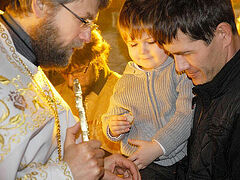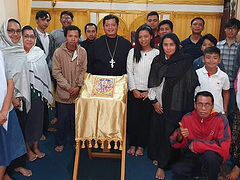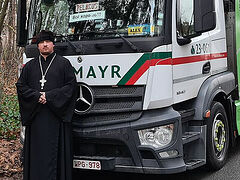Faith in the life of Father Valentin appeared when he was collecting firewood for a parish; he decided to become a priest after an accident; and when he was about to move to New Zealand, doctors misdiagnosed him as having a terminal illness. We talked with Archpriest Valentin Basyuk, rector of St. Nicholas Church in Christchurch (New Zealand), a cleric of the Australian and New Zealand Diocese of ROCOR.
 Archpriest Valentin Basyuk with his family
Archpriest Valentin Basyuk with his family
—Fr. Valentin, how did you convert to the faith and become an Orthodox Christian?
—I was born in Ukraine, in the small yet cozy town of Kostopol of the Rivne region. My grandmother was religious, sometimes she went to church. She had me baptized as a child, but I became a conscious churchgoer later in my youth. At our technical school we had a wonderful teacher, Sergei Vladislavovich Khrestin, who later became a priest (now he serves at the Convent in the village of Khmelevo of the Vladimir region, where my ministry once began). Sergei Vladislavovich arranged various tourist trips for his students, and one of the destinations was St. George’s Church in the village of Ilyinskoye—the only active church in the area. Fr. Pallady, who later became my father-confessor, served there. And when I was helping their parish collect firewood, faith appeared in my life. Through Sergei Vladislavovich, Fr. Pallady, and Sisters Manetha and Joanna who labored at the church I comprehended the world of Orthodoxy and took my first conscious steps in the faith.
After college I entered the university in Vladimir where I studied to be a lawyer. I attended services at the Dormition Convent, and together with Fr. Vladimir Zakharov took part in the restoration of St. Nicholas Church. The period of my studies coincided with my passion for history and philosophy. There I met quite a few strong teachers who instilled an interest in church life and the culture of thought in me.
In addition, I helped in the choir and at the altar. Compulsory practice for all students began from the third year. One of the places where I underwent practical training was the tax inspectorate of the Vladimir region. I was offered a job as a legal adviser for the regional inspectorate, while continuing my studies. It was a hard time, when the economy and the State fiscal system were being destroyed. I was blessed to meet very good people at the inspectorate who worked conscientiously. I remember that experience as blessed and Christian. Later, while serving in the Church, I was more than once convinced that sometimes a secular collective can show a truly Christian spirit.
 The Consecration of St. Nicholas Church, Christchurch On graduating from university I had to choose what to do next. And I decided to give up public service and to serve in the army—to fulfill my duty honestly, so that later I would be free.
The Consecration of St. Nicholas Church, Christchurch On graduating from university I had to choose what to do next. And I decided to give up public service and to serve in the army—to fulfill my duty honestly, so that later I would be free.
After the army, I got married and for some time served as an acolyte in several Moscow churches. I also worked for the Pravoslavnoye Slovo (“Orthodox Word”) newspaper. When I was invited to return to the Vladimir region and become a priest in the convent of Khmelevo, I agreed. For about twenty years I served as an ordinary priest in different parishes and monasteries of the Vladimir diocese, and since 2013 I have served in New Zealand.
—What prompted you to make such a serious decision to become a priest? They just offered, and you agreed?
—Fr. Pallady and other priests advised me to consider the ordained ministry when I was a student. I really loved the Church, but at the same time I doubted: was I really worthy? Was it worth doing? Was it the right time, or too early? Should I make a career first? One should be more mature before ordination.
In 2000, the following incident occurred on the feast of the St. Sergius and the New Martyr Grand Duchess Elizabeth. A very good and wonderful priest, Fr. Anatoly Yakovin (now reposed), served in the village of Pyatnitsa. We ended up with him in the village of Velikodvorie. After the Liturgy and the meal, a friend of mine suggested that we take a ride on the priest’s motorbike. We asked, and he didn’t object. So we went for a ride. On the way back, at a speed of over sixty miles per hour the driver lost control and we flew off the road into the forest! We crashed into three trees at once. We flew over the handle bars for eight yards, but miraculously survived without injuring anything.
After that incident, clarity of mind and determination came to me: Since I wanted to be a priest, I must become one. That event influenced my decision.
—Can you give advice to young (or middle-aged) men seeking the priesthood?
—If you have doubts, take courage. If you are confident, then doubt for a while. I would advise you to think, think and pray. Do not rush to make this choice, especially now that there are new difficulties and challenges. You probably need to wait for the Church to look for you. The moment of calling must come, and it must be obvious. Be not many masters (Js. 3:1)!
 St. Nicholas Church, Christchurch
St. Nicholas Church, Christchurch
—So you served in the Vladimir Diocese until you suddenly went to New Zealand. How did this come about?
—At some point, some people from New Zealand appeared among our parishioners. Surprisingly, they invited me to come to New Zealand, saying “There is a vacancy in Christchurch, a priest is needed there.” Then we met with the Dean of the New Zealand parishes, Fr. Vladimir Boikov, then with Metropolitan Hilarion (Kapral). They approved my candidacy. And in 2013 we moved.
At the time of the move, my wife Alexandra and I had three children (the fourth child was born in New Zealand). During the medical examination it turned out that I had health issues and was supposedly dying. The doctors found numerous spots on my lungs. They believed I had either tuberculosis or cancer. But in the end it turned out that I would live and serve God.
—What impressed you most in the first months of your stay in New Zealand?
—There was no culture shock. We weren’t flying into some perfect world. We didn’t suppose that everything would be fine here. The biggest shock was the issue of emigration and the difficulties associated with it.
—Is there something that you still can’t get used to?
—The distance from loved ones, relatives and acquaintances. This is the main problem. Our parents stayed in Russia. There are many parishioners and friends who stayed in Russia. We can’t get used to it. If you live in Europe, this problem is easier to solve.
—Is New Zealand a good country to live in?
—Definitely! Its only disadvantage is its isolation from the rest of the world. But this can also be a blessing—during a pandemic, for example.
New Zealand has tremendous opportunities for self-fulfillment. Nature, culture, social life—everything works for you! But if it is hard to find yourself, the problem is exacerbated, partly due to the country’s small population. It doesn’t feel that way in Auckland. The South Island has a much freer lifestyle. Depression and despair can come if it is hard to fulfil yourself.
—Are there examples among your parishioners of those who have “found themselves” in New Zealand?
—I could take any of them and tell their stories! Very talented and good people. But emigration can lead to a decrease in one’s social status too.
—What can you say about the atmosphere in the country? Is the way of life quiet or, on to contrary, very dynamic and tense?
—The atmosphere is calm and friendly. I am not idealizing, because there are problems too. In general, everybody is calm and friendly.
—Was the terrorist attack in Christchurch an exception?
—Exactly. There are exceptions to every rule. And the terrorist attack was one of them. Even in a safe and prosperous place like Christchurch, such events can happen. The world is becoming global and transparent, and no one in the world is immune from such phenomena.
 The parish school’s everyday life
The parish school’s everyday life
—Tell us about your parish, please. Who are your parishioners?
—In ROCOR it is customary to distinguish several waves of emigrants. There was the “post-revolution wave”—those people left Russia after 1917. But in New Zealand that wave wasn’t represented in any way.
The second wave is the people who ended up here after WWII. Our parish is directly related to them. There were many migrant workers, prisoners of war, and refugees in Europe at that time., Australia was unable to accept them after they were sent from Europe, but New Zealand accepted them. I have heard many stories of ordinary New Zealanders helping them find jobs, with housing and money. Those people maintained church life even on ships on the way to the country, performing services on board. Later they gathered for worship in garages and on old steamboats. In 1963, a church was built. There are no representatives of that generation left. I met and buried some of them.
There was an interesting case. Once on Holy Friday I was invited to the hospital to see a dying man of about ninety. He was almost unconscious, couldn’t speak, and sometimes only slightly opened his eyes. His daughter invited me to agree on the time of his funeral and bless him before his death. He was half German; he was born and raised in Ukraine, was drafted into the army, went to war, then captured and served in the German Army, then in the British Army and was seriously wounded... He was religious and had been involved in the construction of the church.
When I asked him in Ukrainian if he would like to receive Communion, he opened his eyes, answered “Yes,” and closed them again. I asked him to open his mouth, he opened it silently and took the Body of Christ. I addressed him with the words: “Christ is Risen!” He replied: “Truly He is Risen!” These were the only words that he said.
The doctors had told his daughter that he had several hours to live. After Pascha I had to fly to Australia. I had no idea when and how I could celebrate the funeral service. I suddenly turned to the man and asked him to wait until my return. The daughter didn’t believe that this was possible, but it turned out that way. On the day of my return from Australia she informed me that he had just died.
But now there are no representatives of that wave or their descendants among our parishioners. Some left, others disappeared into the locals. And representatives of the next generation, of whom the parish is mainly composed, began to come to New Zealand from the 1990s on. They were not forced to come here. They came to achieve success in life. This is a special type of people, whose character affects the church life.
In addition to the Russian-speaking parishioners (people from Ukraine, Belarus, Kazakhstan, the Baltic States, and Uzbekistan pray with us too), there are Serbs in our parish. We even have a Serbian deacon. The official mission of the Serbian Church is based on the territory of our church. Our building is home to both Russians and Serbs. We live as one family. There are Romanians too, but now they come less often because a Romanian parish has opened here. There are Chinese, Indians, many Americans and New Zealanders, and Greeks as well. People of all different cultures have become our parishioners.
—In what language do you serve?
—In Church Slavonic, English, and sometimes in Serbian.
—Are the majority of your parishioners men, or women?
—Half and half. They are people of different ages, including families with children.
—Can you outline a social portrait of your typical parishioner?
—They are mostly rather modest people.
—Do many people come to pray on Sundays?
—Sometimes up to 100 people come to services, sometimes more, but there are about fifty permanent parishioners. We have a small church. The narthex measures twelve square meters as does the altar.
—Do your parishioners take an active part in the life of the community? Does the main responsibility for the parish rest on the shoulders of the rector, or does the parish council share this burden, including the financial?
—You’ve hit the nail on the head! This is what we are trying to cultivate in people. And there are positive results. Some people are active and sensitive. Those who bear the daily burden of parish responsibilities are few. An important indicator is the parish meal. There is a schedule of shifts, people participate in this, interact and serve each other in this way. Such a small matter requires serious faith and active work. Here our weaknesses are exposed: greed, quarrels, intrigues, the inability to listen to others, and the unwillingness to work as a team.
The parish now sustains itself, which is wonderful. The income is almost entirely from voluntary donations by regular parishioners. This is a serious indicator of spiritual life. But, unfortunately, Russian-speaking people sometimes need to learn an appropriate attitude towards the Church. Sometimes a Russian, due to a lack of genuine church experience, sincerely believes that the Church is a building or an organization for the provision of national magical services. “It should be supported by the State, by that ‘moneybags’ I condemn, or by these English-speaking people,”—this is the logic that some people have.
Of course, not all Russians think this way; there are serious people, but there are also gaps in knowledge, so they need to learn. There are some funny stories. A woman came up and ardently asked me to confirm that tithing is a “Protestant heresy.” Non-Orthodox Russian-speaking close friends of the woman were accusing her of non-involvement in the financial life of her community. I asked her: “What do you think? What is the appropriate, Orthodox way?” She Answered: “Well, I don’t know. It should be solved by itself somehow. Or I can buy a candle when I want to.” But at the same time she clearly implied that she expected something from everyone, from the Church and God.
—Apparently I’ve struck a chord by my question. In addition to joint meals, what else can you note from your extra-liturgical activities?
—We had a church school before the pandemic. Now there are irregular classes with children: the basics of the faith, literature, speech development, and creative subjects. Besides the meal, there are talks on Sunday afternoons. This has been done on a regular basis for many years with both the young and older generations in English. Now English-speaking parishioners are showing more interest, although our compatriots also come.
There are also barbecue parties and cultural events—exhibitions, performances or concerts. For example, one of our Serbian parishioners has his own band and he organized a concert of Paschal chants for us. Sports events have also been held—from chess to boxing. I visit hospitals, parishioners’ homes on weekdays or even holidays. Living communication takes a lot of time and effort.
To be continued...





